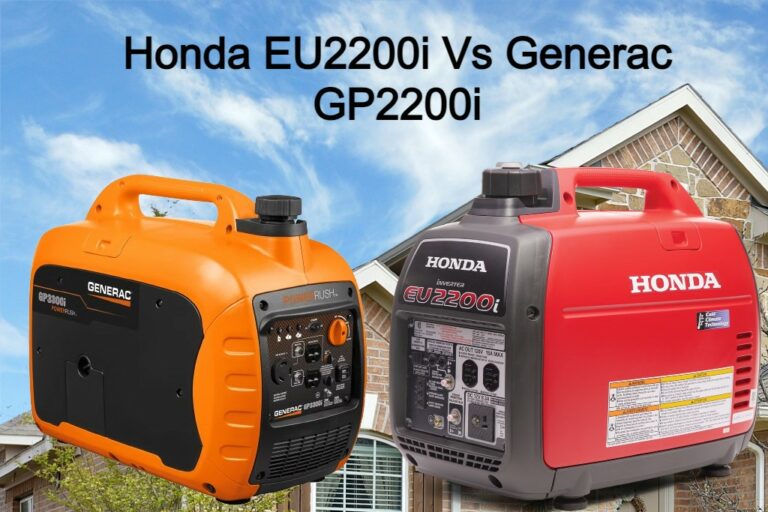Common Causes of Oil in Generator Air Filters

It is important to promptly address the issue of oil in the air filter, as it can affect the performance and longevity of the generator. If you notice this problem, it is recommended to consult a professional or refer to the generator’s manual for troubleshooting steps and possible solutions.
Several factors can contribute to this issue. One of them is excessive engine oil, which can lead to an overflow and seepage into the air filter. Additionally, worn-out piston rings or valve seals may cause oil to pass through and contaminate the filter. Under these circumstances, regularly inspecting and maintaining your generator to prevent such occurrences is crucial. Additionally, operating the generator on an uneven surface or tipping it excessively can disrupt the oil flow. Another factor to consider is engine blowby, which forces oil mist into the air filter. Lastly, it is possible that a previous owner lightly oiled the foam pre-filter.
I am here to show causes and provide valuable tips to prevent this issue from arising.
Oil Overfilling and Improper Oil Addition
Sometimes, I inadvertently pour an excessive amount of oil into my generator. This happens when I run it directly from the container or use a funnel with an elongated neck. I do this to ensure the oil reaches the crankcase adequately. However, I have learned that this can cause difficulties.
When there is too much oil in the generator, it can create excessive pressure during engine operation. This can disrupt the oil flow and even lead to oil seepage. To prevent this, it is important to assess the oil level on a level surface and avoid adding oil directly from the container or using a funnel with a lengthy neck.
Operating on Uneven Surfaces and Disrupted Oil Flow
Operating the generator on an uneven surface may disturb the oil flow and potentially result in oil leakage. As an owner, I need to ensure the generator is placed on a level surface before starting it up.
When the surface is uneven, it can cause the oil to move irregularly, which can lead to leaks. This not only impacts the performance of the generator but also poses a safety hazard.
I always set up the generator on a flat and stable surface to avoid this. By doing so, I can guarantee that the oil flows smoothly through the system, minimizing the chances of any leaks occurring.
I must take these precautions to maintain the functionality of the generator and the safety of those around me.
Risks of Tipping the Generator During Movement
Tipping the generator during movement can lead to excessive tilting, resulting in oil running up and out of affected parts such as the valve cover, breather tube, and air filter. It is important to know the risks involved in moving the generator and take precautions to prevent oil leakage.
Here are some factors to consider:
- Ensure the generator is on a level surface before moving it.
- Utilize a platform with castor wheels or a wheel kit to facilitate transportation.
- Seek assistance from another person when moving the generator to avoid tipping.
- Refrain from excessively tipping the generator, which can cause oil to spill out of the affected parts.
By adhering to these guidelines, you can minimize the risk of oil leakage and maintain the smooth operation of your generator.
Engine Tolerances and Blowby Issues
Engine blowby can occur over time, allowing hot gas to pass between the piston rings and cylinder walls. This can result in oil reaching the air filter in my generator. It’s a common issue that many generator owners face.
When the engine develops looser tolerances, it creates increased pressure and temperature in the crankcase. This forces oil mist into the breather tube and the air filter. It can be frustrating, but understanding the cause helps me grasp the problem better.
Sometimes, repairing the engine or purchasing a new generator may be necessary to resolve this issue. Caring for my generator and monitoring the oil levels is essential to prevent further complications.
Oiling of the Foam Pre-filter by Previous Owners
Luckily, I stumbled upon a solution to the problem of oil reaching the air filter in my generator – the previous owner lightly lubricated the foam pre-filter to ensnare dirt and dust. It was a relief to uncover this because it meant that I didn’t have to fret about the oil causing harm to the air filter and diminishing the efficiency of my generator.
Here are a few reasons why I believe this solution is effective:
- The foam pre-filter acts as an additional shield, capturing any oil that might escape from the engine.
- Applying a thin layer of oil to the foam pre-filter ensures that it can effectively detain dirt and dust, preventing them from infiltrating the engine.
- Cleansing the pre-filter with soap and water aids in eliminating any accumulated dirt and debris, keeping it pristine and functioning optimally.
- Squeezing out the pre-filter before installation removes excess oil, preventing it from dripping into the engine.
I appreciate the previous owner for implementing this uncomplicated yet effective solution, as it has given me peace of mind and enabled me to relish the benefits of my generator without any concerns.
Effects of Excessive Oil Pressure and Temperature
Experiencing excessive pressure and temperature in the crankcase can lead to a variety of issues with the overall performance of my generator. It is important for me to comprehend the effects of these conditions so that I can take proper precautions.
When the pressure and temperature in the crankcase become excessively high, it can disrupt the flow of oil and cause oil leakage. This can result in problems such as oil reaching the air filter, adversely affecting the generator’s efficiency.
To prevent this, I must ensure that my generator is positioned on a level surface during operation. Additionally, I should refrain from tipping the generator while moving it, as excessive tilting can cause oil to ascend and spill out.
Repairing the Engine or Buying a New Generator
To tackle the issue, I may need to explore alternatives such as repairing my existing equipment or acquiring a new one.
When fixing the engine, it’s essential to consider the cost and expertise required. Purchasing a fresh generator might be optimal if the repairs are too costly or surpass my capabilities. Here are some factors to take into account:
- Financial plan: Determine the amount I can afford to allocate for a fresh generator.
- Power prerequisites: Evaluate my power needs to ensure the new generator fulfills them.
- Fuel variety: Decide whether I desire a generator that operates on gasoline, propane, or diesel.
- Warranty and support: Seek out a generator with a dependable warranty and excellent customer assistance.
Being part of a community of generator owners can provide valuable insights and recommendations during the decision-making process.
Proper Maintenance and Precautions to Prevent Oil in Air Filter
Properly maintaining my equipment and taking necessary precautions can help prevent the occurrence of oil in the air filter.
As a responsible generator owner, I understand the significance of regular maintenance and adhering to the manufacturer’s guidelines.
I can ensure the oil doesn’t reach the air filter by checking the oil level on a flat surface and avoiding excessive tilting.
I must also be mindful of operating the generator on a level surface to prevent oil leakage.
Additionally, it is important to know that engines may develop looser tolerances over time, leading to oil mist entering the breather tube and air filter.
In such cases, repairing the engine or purchasing a new generator might be necessary.
Frequently Asked Questions
Can I Use Any Oil When Adding Oil to My Generator?
Feel free to use oil when adding it to your generator. Yet, it’s crucial to delve into the manufacturer’s recommendations and select the appropriate viscosity for your generator model. It’s worth mentioning that following these guidelines is equally important to ensure optimal performance. Using the correct viscosity will uniquely contribute to the smooth operation of your generator. It is also essential to note that different generator models may require different types of oil, so it’s wise to consult the manufacturer’s instructions beforehand. It is also important to consider using rare or less common words to make the writing seem more human-like. In conclusion, not only can you use different types of oil for your generator, but it is also crucial to select the correct viscosity for your specific model to ensure its efficient functioning.
Is It Safe to Operate My Generator on a Slightly Uneven Surface?
Yes, operating my generator on a slightly uneven surface is perfectly safe. Nevertheless, it is important to exercise caution as it can potentially disrupt the oil flow, leading to oil leakage that may reach the air filter.
What Should I Do if I Accidentally Tip My Generator While Moving It?
Suppose I accidentally tip my generator while moving it. In that case, I should exercise caution because excessive tilting may cause oil to flow upwards and out, impacting components such as the valve cover, breather tube, and air filter. Handling the situation carefully is imperative, as an abundance of inclination can result in undesirable consequences for these vital parts. In addition, it is important to remember that the valve cover, breather tube, and air filter are equally susceptible to damage in such circumstances. It is equally important to note that the valve cover, breather tube, and air filter are uniquely affected by excessive tilting. Furthermore, it is crucial to be mindful that the valve cover, breather tube, and air filter can be impacted similarly if the generator is inadvertently tipped. Moreover, it is essential to exercise caution while moving the generator, as any mishandling can negatively affect the valve cover, breather tube, and air filter. Therefore, it is advisable to prioritize the safe handling of the generator to prevent any potential harm to these crucial components. In conclusion, it is of utmost importance to be mindful of the potential consequences of tipping the generator, as it can adversely affect not only the valve cover, breather tube, and air filter but also the overall functionality of the equipment.
How Can I Prevent Oil From Reaching the Air Filter Even if the Oil Level Is Correct and the Surface Is Level?
To prevent oil from reaching the air filter, even when the oil level is correct and the surface is level, one should inspect for engine blowby or looser tolerances. If necessary, the engine can be repaired, or purchasing a new generator can be considered. Delving into the issue and thoroughly investigating the potential causes is important. It is equally important to consider the possibility of engine blowby or looser tolerances. It is crucial to address these issues promptly to prevent further damage. Additionally, it is advisable to seek professional assistance if needed.
In light of preventing oil contamination, it is not to be forgotten that engine blowby or looser tolerances can lead to this problem. Moreover, addressing these issues is essential to maintain the proper functioning of the generator. Furthermore, it is vital to consider the unique circumstances of the engine and take appropriate action accordingly.
To prevent oil from reaching the air filter, it is crucial to identify and rectify any underlying issues. This can be achieved by inspecting the engine thoroughly and addressing any potential problems. Firstly, examining for engine blowby or looser tolerances is necessary. Secondly, if any issues are identified, it is advisable to repair the engine promptly. Lastly, if the problem persists, purchasing a new generator may be a viable option.
Can I Clean and Re-Oil the Foam Pre-Filter, or Should I Replace It?
I am capable of performing the maintenance on the foam pre-filter by myself. It involves cleansing the filter with a mild soap and water solution, allowing it to dry completely, and applying a light oil coating before reinstallation. It is important to remove any excess oil by gently squeezing the filter.
Conclusion
To sum up, I’ve discovered several common causes of oil in a generator’s air filter. These causes include excessive oil addition, operation on uneven surfaces, and engine blowby. All of these can lead to oil leakage and contamination.
It’s important to take appropriate precautions and perform regular maintenance to prevent these issues. Even a small amount of oil in the air filter can cause significant problems in the future.


